In Phuket, from saunas to concerts, restaurants and villas are attracting many Russian tourists for long-term tourism and business.
Russian businessman Alexander Nakhapetov has been a regular visitor to Phuket since a number of traditional bathhouses opened last year. But the 41-year-old’s routine has recently been affected by the influx of Russians to Thailand’s largest island. The influx of Russians has meant that the new bathhouses are often fully booked.
Phuket has long attracted wealthy Russians. Since the conflict in Ukraine began, the influx has accelerated as they struggle to get to other European destinations. The number of villas sold on the island rose 82% to 338 last year, with about half bought by Russians, according to real estate firm Knight Frank Thailand. Businesses ranging from restaurants to saunas and concerts have sprung up to attract the new clientele.
Some 791,574 Russians visited Thailand in the first half of this year, up more than 1,000% from the same period last year, according to the Thai Ministry of Tourism and Sports. More than half of them flew directly to Phuket. Russia has become the island's top tourist market this year, according to the Phuket Tourism Association.
Christian Steinbach, sales director of FazWa Real Estate Group, said Russians are the company's largest group of customers. Last year, he had a transaction with a Russian who bought 16 villas at once to rent out.
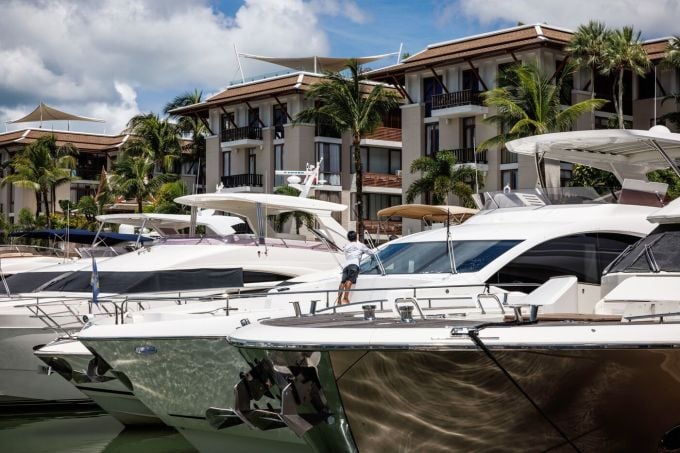
Royal Phuket Marina, home to the Russian consulate. Photo: Bloomberg
Russia opened a consulate in Phuket this month, marking the island’s importance in expanding its diplomatic reach in Southeast Asia. The office is located in the Royal Phuket Marina, a development with marinas, apartments and villas priced from $300,000 to several million dollars.
While countries in Europe and the Middle East have long been the main havens for Russians, the beaches, nightlife and openness of places like Phuket, Krabi and Pattaya in Thailand offered a reasonable alternative in Asia even before the Ukraine conflict.
As tensions escalate, Russians are finding it harder to get to Europe due to the cancellation of direct flights. They are turning to countries with easier visas, such as the UAE, Türkiye and Thailand. Thailand, meanwhile, has introduced several new visa programs over the past year, allowing wealthy or highly skilled people to stay long-term.
As a result, the island attracts many wealthy people and professionals in the information technology, electronic media, digital assets, remote workers and young families, according to Prakaipeth Meechoosarn, Head of Phuket market at CBRE Thailand.
According to Elena Marinicheva, Vice President of Russia Sotheby's International Realty, the typical Russian customer in Thailand is a businessman in his mid-30s from the eastern part of the federation, such as Vladivostok. But investors from Moscow and St. Petersburg are also increasingly finding the Thai real estate market attractive.
The influx of Russians has also helped other businesses that serve the community flourish. Alexander Nakhapetov said his entertainment business is booming. In December, he will host a tour of the St. Petersburg State Ballet on the island.
Western sanctions have led to Visa and Mastercard suspending operations in Russia. However, transactions for Russian visitors in Phuket can still take place via UnionPay, digital currencies, US dollars and euros in cash.
Thais are adapting to the needs and habits of Russian tourists. Phuket International Airport has announcements in Russian. Many shop names and street signs are written in Russian. Street vendors have added borscht (a traditional Eastern European soup) and bliny (Eastern European sponge cake) to local dishes such as pad Thai and tom yum soup.
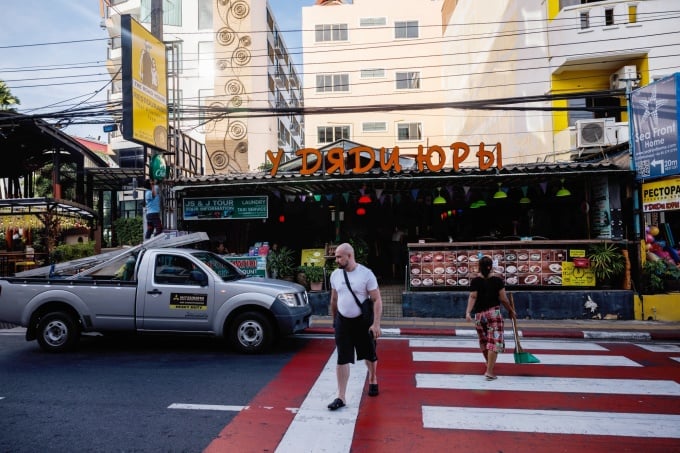
A Russian restaurant in Phuket. Photo: Bloomberg
The Russian restaurant chain Veranda recently opened its fifth Thai location on the island. And Nikolay Batargin, owner of the Phuket restaurant Chekhoff, recently opened his third location serving Russian food. “Business is especially crazy during the island’s peak season from November to April,” he said.
Thailand’s allure has also attracted the super-rich. The 72m Cloudbreak yacht, believed to belong to Russian property tycoon Alexander Svetakov, was spotted in Phuket last Christmas, while building materials billionaire Igor Rybakov hosted business training classes for a group of 20 people on the island in January.
Trade has boosted the economy and provided jobs in Phuket, which relies on tourism and investment, but the influx of Russians has also pushed some potential buyers from Thailand and other countries out of the market. Local workers are also feeling the pinch of inflation and rising rents.
But post-pandemic, most people are willing to accept the challenges, as long as Thailand remains safe from geopolitical turmoil. Yuri Vorona, manager of the Roadhouse restaurant in Phuket, which caters mainly to Russians and occasionally Ukrainians, said the atmosphere was peaceful. “We have Russians every day who just want to relax and not fight,” he said.
Phien An ( according to Bloomberg )
Source link





![[Photo] Prime Minister Pham Minh Chinh launched a peak emulation campaign to achieve achievements in celebration of the 14th National Party Congress](https://vphoto.vietnam.vn/thumb/1200x675/vietnam/resource/IMAGE/2025/10/5/8869ec5cdbc740f58fbf2ae73f065076)

![[Photo] Prime Minister Pham Minh Chinh chairs the Government's online conference with localities](https://vphoto.vietnam.vn/thumb/1200x675/vietnam/resource/IMAGE/2025/10/5/264793cfb4404c63a701d235ff43e1bd)


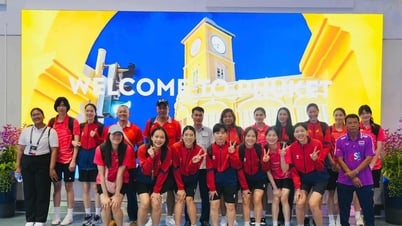
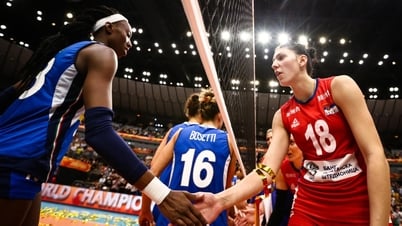
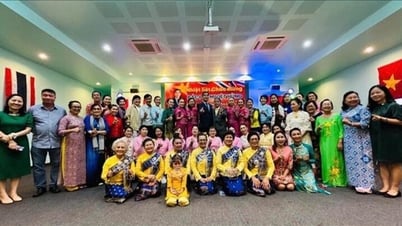



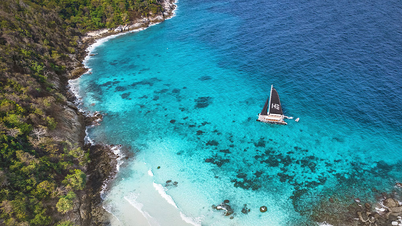
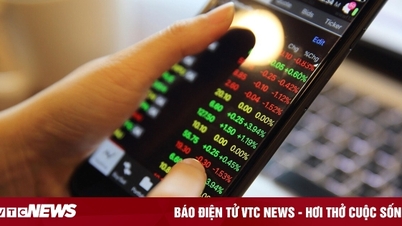



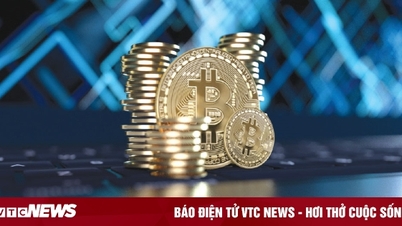
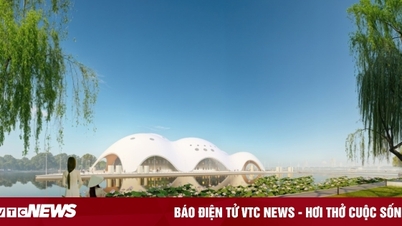
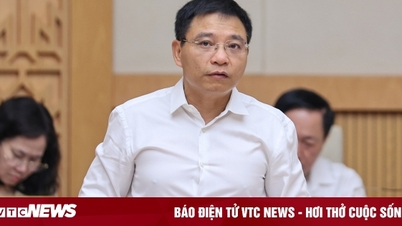
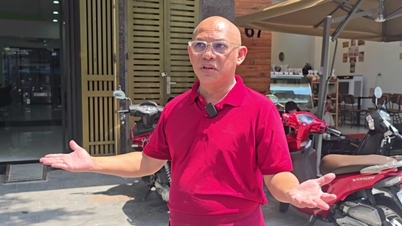


































![[VIDEO] Summary of Petrovietnam's 50th Anniversary Ceremony](https://vphoto.vietnam.vn/thumb/402x226/vietnam/resource/IMAGE/2025/10/4/abe133bdb8114793a16d4fe3e5bd0f12)

![[VIDEO] GENERAL SECRETARY TO LAM AWARDS PETROVIETNAM 8 GOLDEN WORDS: "PIONEER - EXCELLENT - SUSTAINABLE - GLOBAL"](https://vphoto.vietnam.vn/thumb/402x226/vietnam/resource/IMAGE/2025/7/23/c2fdb48863e846cfa9fb8e6ea9cf44e7)














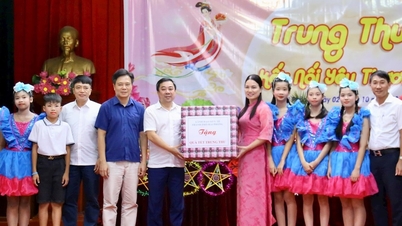

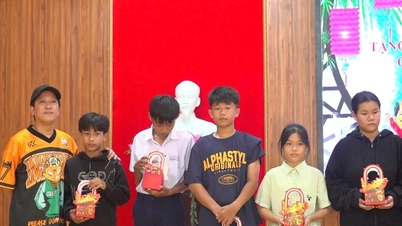

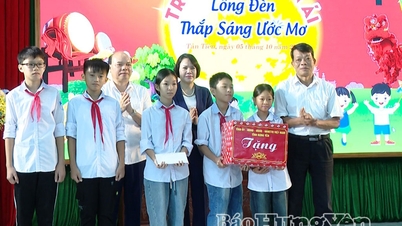

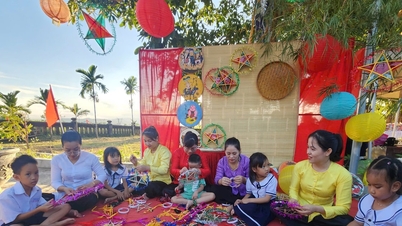
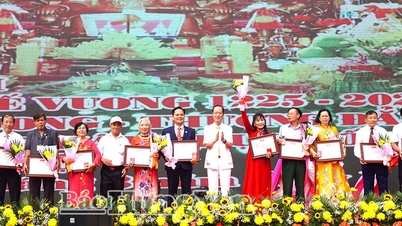
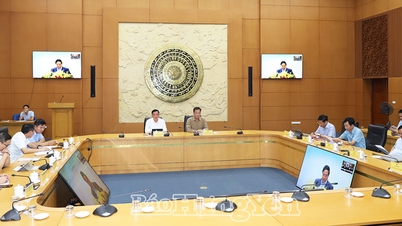













Comment (0)